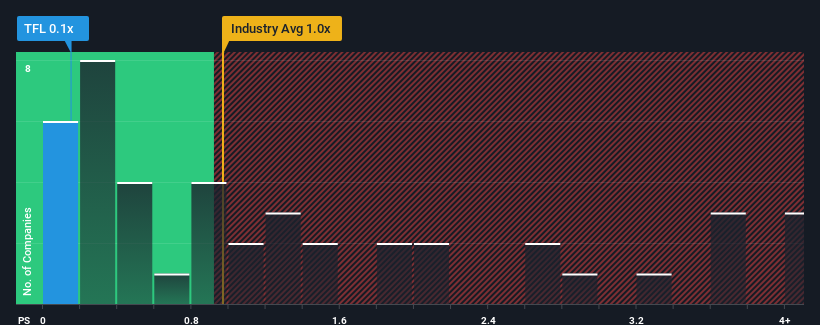Investors Aren't Entirely Convinced By TasFoods Limited's (ASX:TFL) Revenues

With a price-to-sales (or "P/S") ratio of 0.1x TasFoods Limited (ASX:TFL) may be sending bullish signals at the moment, given that almost half of all the Food companies in Australia have P/S ratios greater than 1x and even P/S higher than 3x are not unusual. Nonetheless, we'd need to dig a little deeper to determine if there is a rational basis for the reduced P/S.
See our latest analysis for TasFoods

What Does TasFoods' P/S Mean For Shareholders?
TasFoods could be doing better as it's been growing revenue less than most other companies lately. The P/S ratio is probably low because investors think this lacklustre revenue performance isn't going to get any better. If you still like the company, you'd be hoping revenue doesn't get any worse and that you could pick up some stock while it's out of favour.
Want the full picture on analyst estimates for the company? Then our free report on TasFoods will help you uncover what's on the horizon.How Is TasFoods' Revenue Growth Trending?
The only time you'd be truly comfortable seeing a P/S as low as TasFoods' is when the company's growth is on track to lag the industry.
If we review the last year of revenue, the company posted a result that saw barely any deviation from a year ago. Still, the latest three year period has seen an excellent 38% overall rise in revenue, in spite of its uninspiring short-term performance. Therefore, it's fair to say the revenue growth recently has been great for the company, but investors will want to ask why it has slowed to such an extent.
Shifting to the future, estimates from the only analyst covering the company suggest revenue should grow by 8.5% each year over the next three years. With the industry only predicted to deliver 6.0% per year, the company is positioned for a stronger revenue result.
With this information, we find it odd that TasFoods is trading at a P/S lower than the industry. Apparently some shareholders are doubtful of the forecasts and have been accepting significantly lower selling prices.
The Key Takeaway
Generally, our preference is to limit the use of the price-to-sales ratio to establishing what the market thinks about the overall health of a company.
To us, it seems TasFoods currently trades on a significantly depressed P/S given its forecasted revenue growth is higher than the rest of its industry. When we see strong growth forecasts like this, we can only assume potential risks are what might be placing significant pressure on the P/S ratio. It appears the market could be anticipating revenue instability, because these conditions should normally provide a boost to the share price.
And what about other risks? Every company has them, and we've spotted 3 warning signs for TasFoods you should know about.
It's important to make sure you look for a great company, not just the first idea you come across. So if growing profitability aligns with your idea of a great company, take a peek at this free list of interesting companies with strong recent earnings growth (and a low P/E).
Valuation is complex, but we're here to simplify it.
Discover if TasFoods might be undervalued or overvalued with our detailed analysis, featuring fair value estimates, potential risks, dividends, insider trades, and its financial condition.
Access Free AnalysisHave feedback on this article? Concerned about the content? Get in touch with us directly. Alternatively, email editorial-team (at) simplywallst.com.
This article by Simply Wall St is general in nature. We provide commentary based on historical data and analyst forecasts only using an unbiased methodology and our articles are not intended to be financial advice. It does not constitute a recommendation to buy or sell any stock, and does not take account of your objectives, or your financial situation. We aim to bring you long-term focused analysis driven by fundamental data. Note that our analysis may not factor in the latest price-sensitive company announcements or qualitative material. Simply Wall St has no position in any stocks mentioned.
About ASX:TFL
TasFoods
Engages in the processing, manufacture, and sale of Tasmanian-made food products in Australia.
Slight and slightly overvalued.
Market Insights
Community Narratives



